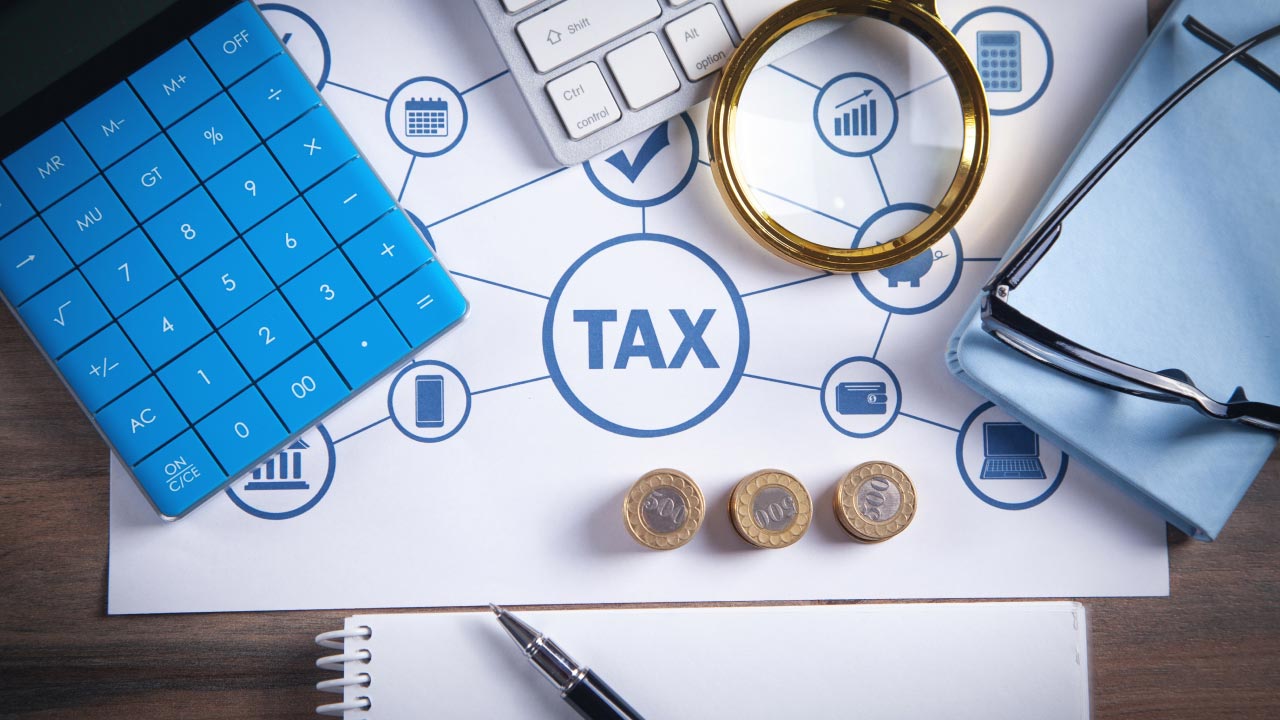How Is Futures Trading Taxed?
Learn how is futures trading taxed, including key rules, IRS classifications, and what it means for your capital gains.

Consider making trades that could significantly boost your bottom line, only to discover that taxes would eat up a considerable portion of your profits. Sounds discouraging. Instead of getting stuck on the financial implications of futures trading, learn how to trade futures successfully to achieve your financial goals.
One of the critical steps to this process is understanding how futures trading is taxed. In this guide, we'll walk you through the specifics of futures trading taxes, including the unique 60/40 tax treatment that can help you keep more of your profits in your pocket.
To get you started on the right foot, AquaFutures offers an innovative solution to help you understand and navigate futures trading taxes. Funded accounts for futures trading allow you to practice trading futures with less stress and improve your skills before going live.
How Is Futures Trading Taxed?

Futures trading in the U.S. is taxed under a distinct set of rules known as Section 1256 of the Internal Revenue Code. These regulations grant futures contracts a unique "60/40" tax treatment, where 60% of gains are taxed at the more favorable long-term capital gains rate and 40% are taxed at the higher short-term rate, even if you held your position for just a few minutes.
As of 2025, this means the maximum federal tax rate on section 1256 gains is 26.8%, a significant advantage over standard stock or crypto trades, which may be taxed at rates as high as 37% for short-term gains. For instance, if you made $10,000 in profits trading oil futures over a series of day trades, $6,000 of that would receive the lower long-term capital gains rate, and only $4,000 would be taxed as short-term income.
What Qualifies as a Section 1256 Contract?
Section 1256 covers most regulated futures contracts, specific foreign currency contracts, non-equity options, dealer equity options, and dealer securities futures contracts. That includes futures on major U.S. exchanges, options on broad stock indexes, and many commodity futures. However, single-stock futures and most over-the-counter (OTC) derivatives typically do not qualify for this exemption.
Mark-to-Market Accounting
At the end of each tax year, all open Section 1256 contracts are marked to market. This means they are treated as if they were sold at fair market value on December 31st. Any unrealized gains and losses must be reported along with realized profits or losses from trades that have already closed. For example, suppose you buy a wheat futures contract for $15,000, and at year’s end it’s worth $16,000, on your tax return, you must report a $1,000 gain, whether or not you sold the contract.
Exemption from Wash-Sale Rules
Futures contracts under Section 1256 are exempt from the wash-sale rules that apply to stock trading. This means you don’t have to worry about having losses on futures positions disallowed if you re-enter a similar position within 30 days, a common issue with equities.
Loss Carryback and Carryforward Provisions
If you incur a net loss on Section 1256 contracts, you may elect to carry that loss back up to three years, offsetting gains from prior years. For example, suppose you had significant futures gains in 2023 and then suffered a loss in 2025. You can apply the 2025 loss to reduce your 2023 tax bill (and, if needed, your 2024 and 2022 tax bills). Any amount not used by carryback may be carried forward to future years. There are limits, though: the amount cannot exceed your net Section 1256 gains in a given year, and you can't create or increase an operating loss for that prior year.
Reporting Your Trades
Profits and losses from Section 1256 contracts are reported using IRS Form 6781, not the standard equity forms. This form handles both your annual mark-to-market gains and losses, as well as any carryback elections that may be applicable. It's essential to keep detailed records of each trade for accurate reporting.
Example
Suppose Dana, an active day trader, makes $7,500 trading S&P 500 index futures in July. By year-end, her open positions show another $2,500 in unrealized gains. On December 31, the IRS treats these open positions as sold. On her tax return, Dana reports a total increase of $10,000 ($7,500 realized and $2,500 unrealized). Of this, $6,000 is taxed at the long-term capital gains rate, and $4,000 at her ordinary income rate.
Related Reading
- How To Trade Futures Successfully
- What Are Futures In Trading
- What Is The Best Futures Trading Platform
- How Many Futures Trading Days In A Year
- What Is A Point In Futures Trading
- How Much Can You Make Trading Futures
- Can You Trade Futures On TradingView
- How Much To Trade Futures
- When Is The Best Time To Trade Futures
- How Are Futures Similar To Options How Are They Different
- Beginning Futures
- What Time Does Futures Market Open
- Automated Futures Trading
Why Taxes on Futures Are Different

Tax rules for futures contracts differ because the government introduced special guidelines aimed at derivatives. This decision followed the emergence of creative traders who began employing complex tax strategies, making it challenging for officials to keep pace. Rather than chasing every new scheme, authorities decided to offer futures favorable tax treatment right from the start.
Futures contracts are typically leveraged and held for short periods, usually ranging from a few days to a few weeks. If these trades were taxed like stocks, most gains would be subject to short-term rates, which can climb as high as 37% for some taxpayers. Instead, futures contracts benefit from Section 1256, which splits profits: 60% are taxed at long-term capital gains rates, and 40% are taxed at short-term capital gains rates. This combination often saves active traders a lot of money.
For comparison, day traders who focus on stocks pay ordinary income rates on all their gains, with no break for frequent trading. But futures traders have a built-in advantage thanks to this special rule. The purpose isn’t simply to reward them, it’s to ensure that derivative markets remain active and healthy, benefiting the broader financial system.
Related Reading
- Futures Trading Example
- Futures Trading Algorithms
- Stocks Vs Futures
- Futures Backtesting
- How To Buy Copper Futures
- Practice Futures Trading
- Futures Swing Trading
- Futures Prop Firms
- Automated Futures Trading Strategies
- Most Volatile Futures
Tips to Maximize Tax Efficiency as a Futures Trader

Futures trading presents a distinct tax landscape that can be leveraged for enhanced efficiency. Understanding core principles and applying strategic measures can help futures traders optimize their tax outcomes while maintaining focus on successful trading.
Leverage Section 1256 Tax Benefits
Futures trading opens doors to a unique tax environment that can be leveraged for greater efficiency and profitability. Futures contracts fall under Section 1256 of the Internal Revenue Code, which offers favorable tax treatment. Gains and losses are treated as 60% long-term and 40% short-term capital gains, regardless of holding period. This split generally results in a lower overall tax rate compared to typical short-term equity trades, where gains are taxed fully at the higher short-term rate.
Avoiding the Wash Sale Rule
Unlike stocks, Section 1256 contracts are exempt from the wash sale rule. This means traders can sell at a loss and immediately repurchase similar futures contracts without waiting the 30 days. This provision benefits futures traders who employ automated strategies that necessitate continuous market exposure, enabling tax-loss harvesting without disrupting their trading systems.
Maximize Deductions by Keeping Meticulous Records
Professional futures traders can claim business-related deductions on expenses such as:
- Research and trading education
- Software and technology infrastructure (like using VPS solutions)
- Development and refinement of trading indicators and systems
Maintaining detailed documentation supports these deductions, reducing taxable income effectively.
Use Professional Infrastructure for Compliance and Stability
Stable and reliable trading setups, such as utilizing VPS solutions, ensure precise trade execution. This infrastructure not only supports consistent trading strategies but also facilitates compliance by maintaining clear records of trades and positions, which are essential during tax preparation.
Consider Trader Tax Status and Professional Advice
While many futures traders benefit from straightforward reporting using software (Form 6781 usually reports a 60/40 tax split automatically), more complex scenarios like trading through multiple platforms, foreign futures contracts, or significant losses may require consultation with a CPA specialized in trader taxes. Such professional guidance can optimize tax strategy further and ensure compliance with evolving regulations.
Additionally, if you are seeking to advance your trading career or expand your capital base, AquaFutures is a prop firm that specializes in futures trading. They offer funded accounts to qualified traders, allowing you to apply professional, tax-efficient trading strategies using significant firm-backed capital. This partnership can be especially valuable for traders seeking growth without risking solely personal funds, while still benefiting from the tax advantages unique to futures contracts.
Let’s Talk About AquaFutures
AquaFutures provides traders with fast and affordable access to funded futures accounts, featuring instant options, straightforward rules, and genuine payouts. Whether you're looking to skip evaluations or grow through performance-based scaling, our programs are designed to reward consistency without unnecessary restrictions.
Join thousands of traders who trust AquaFutures for transparent rules, fast support, and real capital. Ready to take the next step in your trading journey? Explore our account options and get funded today. Unlock up to 50% off your first funded account—plus surprise BOGO deals and bonuses updated weekly.
Unlock up to 50% off Your First Funded Account for Futures Trading.

AquaFutures provides traders with fast and affordable access to funded futures accounts, featuring instant options, straightforward rules, and genuine payouts. Whether you're looking to skip evaluations or grow through performance-based scaling, our programs are designed to reward consistency without unnecessary restrictions.
Join thousands of traders who trust AquaFutures for transparent rules, fast support, and real capital. Ready to take the next step in your trading journey? Explore our account options and get funded today. Unlock up to 50% off your first funded account—plus surprise BOGO deals and bonuses updated weekly.
Related Reading
- Where To Trade Futures
- How To Trade In Currency Futures
- How To Trade Futures With A Small Account
- Best Futures To Trade At Night
- Best Futures Prop Firms
- Best Automated Futures Trading System
- Futures Trading Tools
- Futures Swing Trading Prop Firm
- Best Brokers For Futures Trading
.png)





